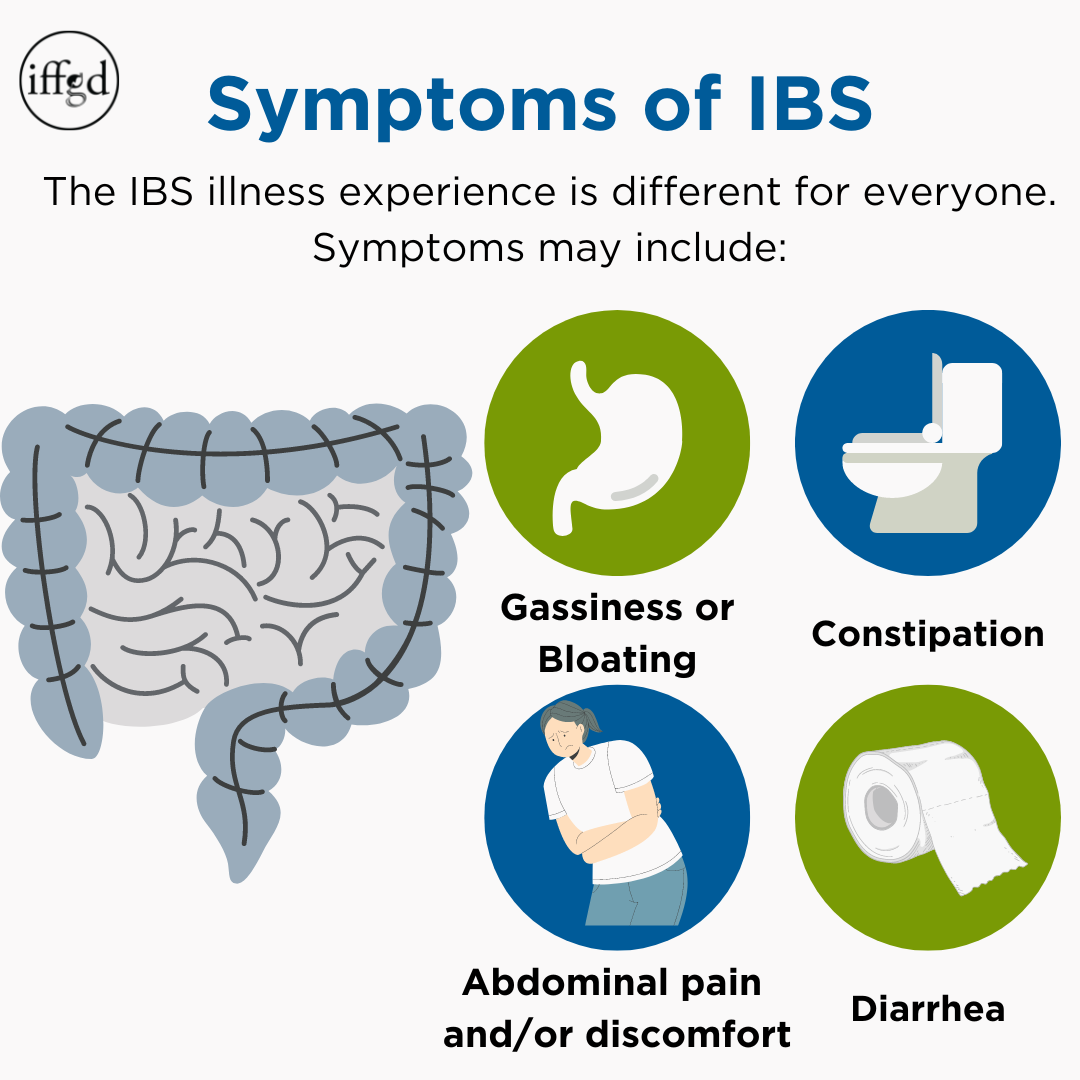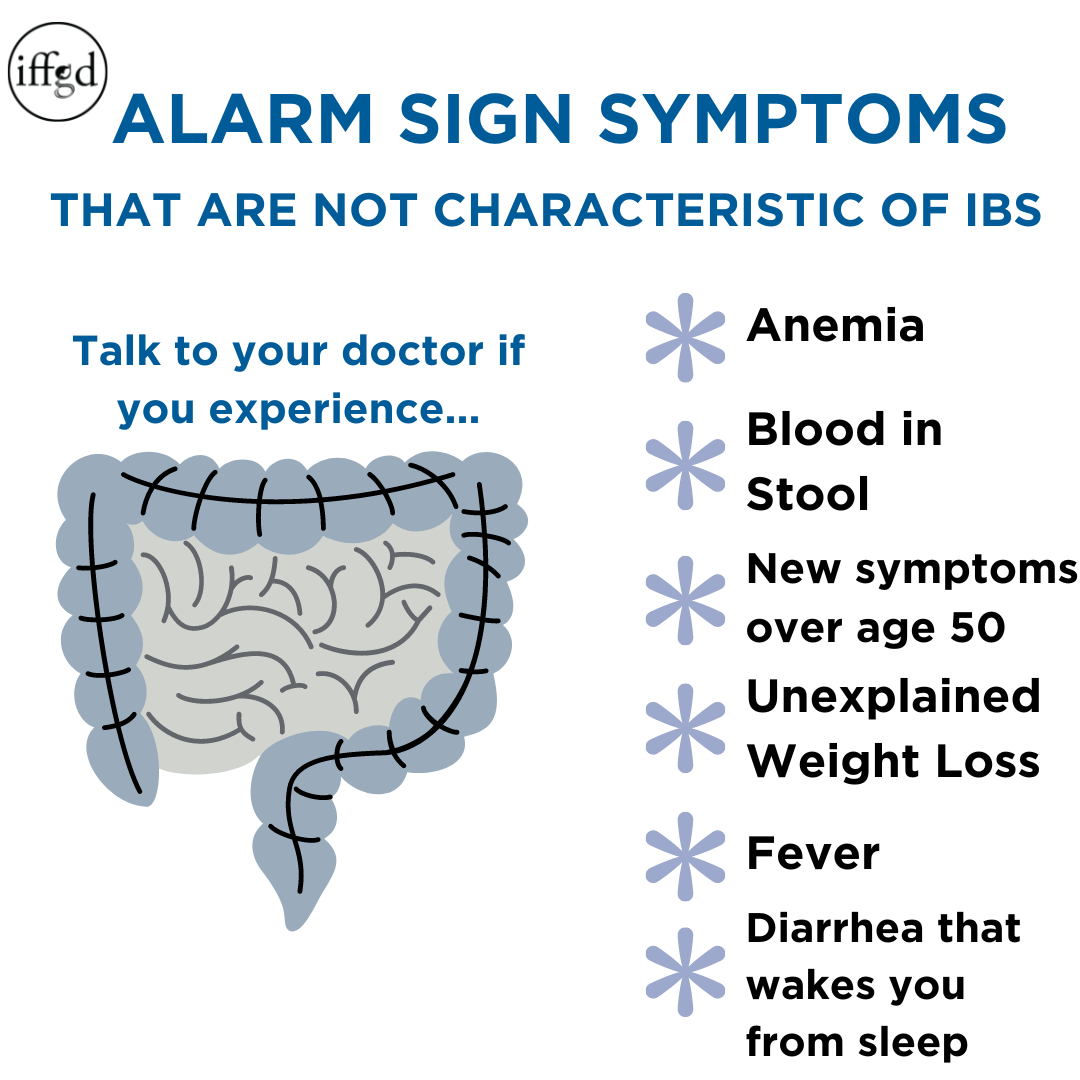Abnormal functioning of the nerves and muscles of the bowel produce the symptoms of IBS. A “dysregulation” between the brain, the gut, and the central nervous system causes the bowel to become “irritated,” or overly sensitive to stimuli. Symptoms may occur even in response to normal events.
A number of symptoms that occur together characterize irritable bowel syndrome (IBS). While there is no cure for IBS, symptoms may last over a long term and can come and go overtime. People with IBS may experience symptoms concurrently (at the same time) and some may be worse then others.
- The key sign or symptom of IBS is pain or discomfort in the abdomen. The abdomen is the area below your chest and above your hips.
Read more about pain in IBS- Abdominal pain is often described as crampy, or as a generalized ache with periods of cramps.
- A change in bowel habits such as frequency or consistency of the stool (diarrhea or constipation) can occur. These changes link to the pain.

- You may experience bloating (a sensation of fullness in thebelly)
- Urgency (the need to rush to have a bowel movement)
- Mucus (thick, white or yellow liquid) in the stool
- You may also experience feeling incomplete emptying after a bowel movement
- Sharp, dull, gas-like, or modest pains are common.
- The IBS discomfort or pain usually feels better after a bowel movement.
These symptoms can change over time. There may be periods when symptoms get worse as well as when symptoms lessen or disappear. The main type of bowel movements experienced can also change over time. Some people who suffer mainly from constipation (or diarrhea) may later experience a change to the opposite or develop a mixture of both constipation and diarrhea.
Sometimes changes in diet, lifestyle, or using over the counter remedies or prescription medications can lead to such changes.
Symptom Patterns Add Up To IBS
Certain signs and symptoms occur with IBS. Symptom-based criteria for IBS emphasize a positive diagnosis rather than extensive tests to rule out all other diseases. No tests confirm the diagnosis of IBS.
Read more about IBS diagnosis
A detailed history, physical examination, and limited diagnostic tests help confirm the IBS diagnosis. More extensive testing is reserved for specific situations.
Other Symptoms May Accompany IBS
Persons treated for IBS commonly report upper gastrointestinal (GI) symptoms. About 25% to 50% report…
- Heartburn
- Early feeling of fullness (satiety)
- Nausea
- Abdominal fullness
- Bloating
Non-GI symptoms also occur. Sometimes, but not always, this may be due to an overlap of IBS with another condition. These symptoms include…
- Fatigue
- Muscle pain
- Sleep disturbances
- Sexual dysfunction
- Low back pain
- Headache
Tracking symptoms
Symptoms sometimes seem contradictory, such as alternating diarrhea and constipation. It may help to keep a Symptom Diary so your doctor can see how your symptoms change over time and in relation to diet, stress, and other factors.
Get the Symptom Diary
Symptoms NOT Characteristic of IBS
Symptoms of…
- Low blood counts (anemia)- determined by blood work or lab tests ordered a by healthcare provider,
- blood in the stools- this blood can be red to black in color and may be in or around the stool
- unexplained weight loss, or
- fever
are not characteristic of IBS. You should alert your physician immediately if you are experiencing these symptoms.
Other signs or symptoms that call for special consideration before being attributed to IBS include:
- A new onset of symptoms over the age of 50
- Diarrhea that wakes you up from sleep at night
- Change in the symptom quality (e.g., new and different pain)
- Recent use of antibiotics
- A family history of other gastrointestinal diseases like inflammatory bowel disease (IBD), colon cancer, or celiac disease

Go Deeper…There’s a Lot More to Discover About IBS
IFFGD’s publications are written by noted doctors and therapists from around the world. Here are some suggestions: Gynecological Aspects of IBS looks at IBS features in women. IBS in Men: A Different Disease? looks at IBS features in men. We have many publications about IBS available as PDFs in our library.
(a system for diagnosing functional gastrointestinal disorders based on symptoms) for IBS is as follows:
Recurrent abdominal pain, on average, at least 1 day per week in the last 3 months, associated with 2 or more of the following criteria:
- Related to defecation
- Associated with a change in frequency of stool
- Associated with a change in form (appearance) of stool* Criteria fulfilled for the last 3 months with symptom onset at least 6 months prior to diagnosis.
Adapted from IFFGD Publication #101 By: Lin Chang MD, Professor of Medicine at the David Geffen School of Medicine at UCLA, Los Angeles, CA. Adapted from article by Douglas A. Drossman MD, Drossman Gastroenterology PLLC, Chapel Hill, NC; Edited by William D. Chey MD, Nostrant Collegiate Professor, University of Michigan, Ann Arbor, MI









